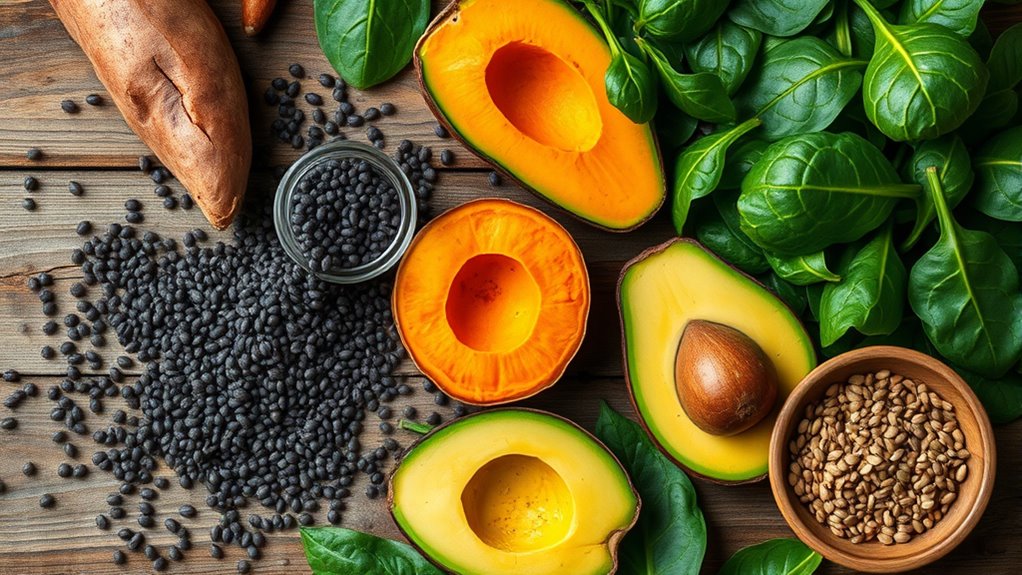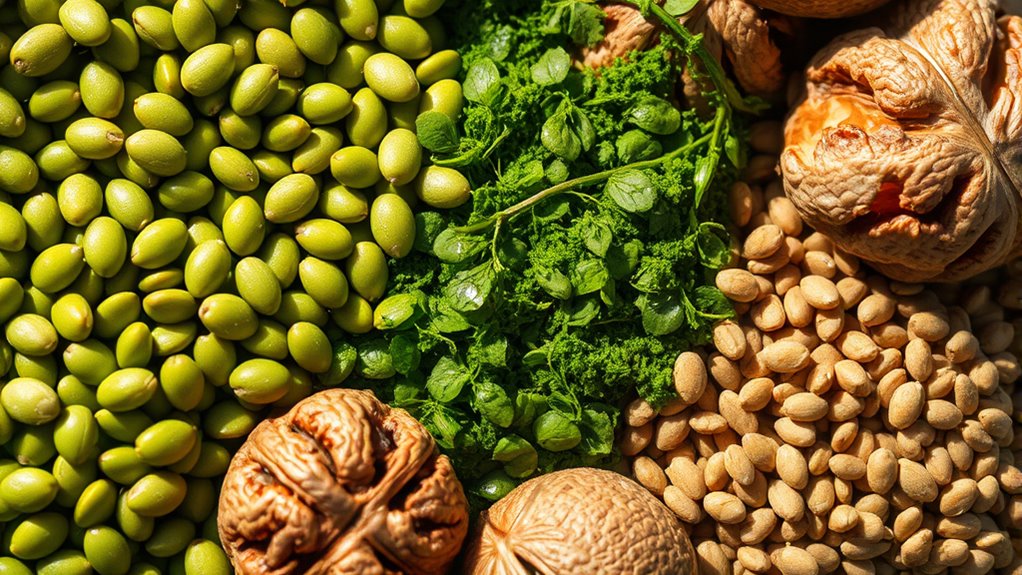You can boost your brain health with plant-based omega-3 sources like algae oils and chia seeds. Algae oils offer EPA and DHA without the heavy metals often found in fish. Chia seeds provide ALA, which your body converts into omega-3s, along with fiber and protein. It’s easy to add these nutritious ingredients to your meals, enhancing your diet without relying on fish. There’s so much more to explore about these options to support your well-being.
Key Takeaways
- Algae-derived oils provide direct EPA and DHA sources, supporting brain health without fish-derived contaminants.
- Chia seeds are rich in ALA, a plant-based omega-3 that contributes to overall health and can be converted to EPA and DHA.
- Incorporating chia seeds into meals enhances omega-3 intake while adding fiber and protein for nutritional balance.
- Omega-3s help reduce inflammation, support cardiovascular health, and improve mood, contributing to overall cognitive function and wellness.
- The growing trend of plant-based diets promotes sustainable omega-3 sources, allowing for nutrient-rich options without reliance on fish.

When you’re looking to boost your omega-3 intake without relying on fish, plant-based sources offer a fantastic alternative. One of the most notable sources is algae derived oils. These oils are extracted from specific types of algae, which are rich in eicosapentaenoic acid (EPA) and docosahexaenoic acid (DHA)—two essential fatty acids that play a crucial role in brain health. The beauty of algae derived oils is that they provide a direct source of omega-3s without the heavy metals or contaminants often found in fish. If you’re vegan or vegetarian, these oils can be a game changer for keeping your omega-3 levels in check.
Another powerhouse in the plant-based omega-3 realm is chia seeds. You might already know about the chia seed benefits, but they deserve a spotlight. These tiny seeds pack a punch of alpha-linolenic acid (ALA), a type of omega-3 that your body can convert into EPA and DHA, albeit at a lower efficiency. Just a couple of tablespoons of chia seeds can give you a hefty dose of omega-3s, along with fiber and protein. When you incorporate chia seeds into your diet, you’re not only getting healthy fats but also a variety of nutrients that support overall health.
Incorporating these plant-based sources into your meals can be simple and delicious. You can sprinkle chia seeds on your morning oatmeal, blend them into smoothies, or even mix them into baked goods for an extra nutritional boost. Similarly, you can add algae derived oils to your salad dressings or smoothies for an easy omega-3 infusion. This way, you won’t have to compromise on your nutritional needs while adhering to a plant-based lifestyle. Additionally, the growing trend of generative AI in media is making it easier for individuals to find innovative recipes that incorporate these nutritious ingredients.
The benefits of omega-3s extend beyond brain health. They can help reduce inflammation, support heart health, and even improve mood. By choosing algae derived oils and chia seeds, you’re setting yourself up for a well-rounded nutrient intake that supports your well-being. Whether you’re trying to enhance cognitive function or simply maintain a healthy lifestyle, these plant-based omega-3 sources can play a vital role. So, the next time you think about boosting your omega-3s, remember that you don’t have to rely on fish; nature has provided you with fantastic alternatives to nourish your body and mind.
Frequently Asked Questions
Can I Get Enough Omega-3 on a Vegan Diet?
Yes, you can get enough omega-3 on a vegan diet! You’ll find vegan sources like flaxseeds, chia seeds, hemp seeds, and walnuts rich in alpha-linolenic acid (ALA), a type of omega-3. To enhance omega-3 absorption, try pairing these foods with healthy fats, like avocados or olive oil. Consider incorporating algae-based supplements for direct EPA and DHA benefits too. With the right choices, you’ll support your brain health effectively!
What Are the Health Benefits of Omega-3 Fatty Acids?
You might think omega-3s are just fancy fish food, but they’re vital for brain development and reducing inflammation. By including them in your diet, you support cognitive function, enhancing memory and concentration. Plus, they help combat chronic inflammation, which can lead to various health issues. So, while it may seem ironic that you can thrive without fish, embracing plant-based sources guarantees you still get these essential fatty acids for maximum health.
How Do Plant-Based Omega-3s Compare to Fish-Based Sources?
Plant-based omega-3s, like algal oils, offer comparable benefits to fish-based sources, but their omega-3 bioavailability can vary. While fish oils provide EPA and DHA directly, algal oils supply these essential fatty acids in a plant-based form. You’ll find that algal oils are a great alternative, especially for those avoiding fish. Just be sure to choose high-quality products to maximize absorption and reap the full benefits for your health.
Are There Any Side Effects of Omega-3 Supplements?
Yes, omega-3 supplements can have side effects. Some people experience gastrointestinal issues like bloating, diarrhea, or nausea. You should also be aware of potential allergic reactions, especially if you’re sensitive to fish or shellfish, even with plant-based sources. It’s important to start with a lower dose and monitor your body’s response. If you notice any adverse effects, consult a healthcare professional for guidance on adjusting your supplement intake.
How Much Omega-3 Do I Need Daily?
You need about 250 to 500 mg of omega-3 daily to keep your body humming like a well-tuned engine. To maximize omega-3 absorption, pair it with healthy fats, as it helps your body utilize it efficiently. Beware of omega-3 oxidation, which can diminish its benefits, so store your supplements in a cool, dark place. By staying mindful of these factors, you’re fueling your brain health effectively and safely.
Conclusion
Embracing plant-based omega-3 sources doesn’t mean sacrificing your brain health. While fish may be the traditional choice, options like flaxseeds and walnuts offer powerful benefits without the environmental concerns. You can nourish your mind with nature’s bounty, enjoying vibrant health and sustainability in one bite. So, whether you’re a committed vegan or simply looking to diversify your diet, remember that the path to ideal brain function can be green, delicious, and completely fish-free.










